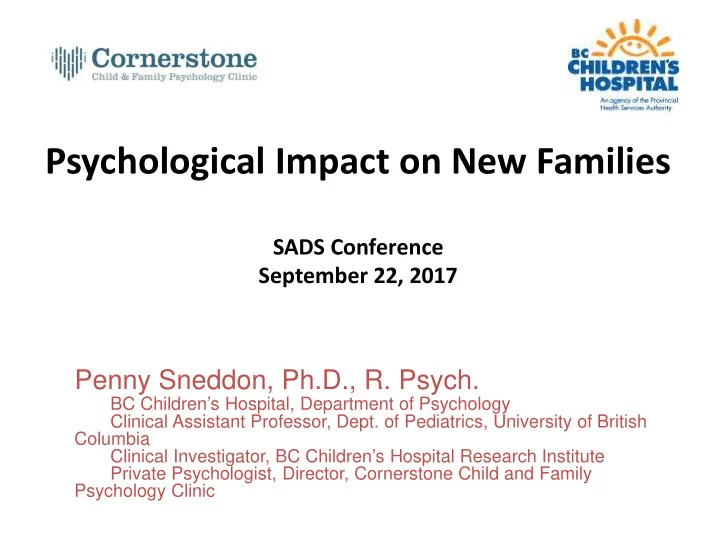

Psychological Impact on New Families SADS Conference September 22, 2017 Penny Sneddon, Ph.D., R. Psych. BC Children’s Hospital, Department of Psychology Clinical Assistant Professor, Dept. of Pediatrics, University of British Columbia Clinical Investigator, BC Children’s Hospital Research Institute Private Psychologist, Director, Cornerstone Child and Family Psychology Clinic
Today’s talk • Common emotional reactions to a new diagnosis of a life-threatening arrhythmia • Research • Ways health care practitioners can facilitate adaptive coping
Emotional reactions to a new diagnosis • Emotional reactions range significantly • Emotional reactions can fluctuate over time
Common Challenges • Anxiety/Depression • Adjustment issues – Understanding condition – Lifestyle changes • Trauma • Treatment adherence • Parenting – Supporting parents’ anxiety – finding the new normal – Behavioural concerns/Acting out • Marital difficulties
Research: Psychological Impact of arrhythmia diagnosis • Adults with life-threatening arrhythmias are at increased risk of experiencing anxiety and depression – Poor adjustment to ICD is associated with a significantly increased risk of anxiety and depression
Research: Psychological Impact of arrhythmia diagnosis • Children with chronic medical conditions are TWICE as likely to have psychosocial challenges • Limited research on psychological impact of having an arrhythmia in children • Children/Teens with life-threatening arrhythmia often experience high levels of anxiety about their condition and prognosis – Children with ICDs report frequent worry about receiving shocks – Children with ICD reported increased levels of anxiety disorder and lower QOL vs. those with pacemakers
Research: Psychological Impact of arrhythmia diagnosis • Conclusion: – Growing evidence of increased risk for psychological distress in individuals with life threatening arrhythmias – Need for more research in this area
The role of Health Care Practitioners: Beyond Medical Support • Why is it important to recognize emotional reactions? – Titrate information accordingly – Helping patients/families access appropriate supports • There are effective treatments for coping – Some research suggests that strong emotions might destabilize cardiac electrophysiology
How can we help? Delivering the diagnosis • Give the patient/family time to prepare themselves • e.g., I want you to sit down so we can talk about some really important findings. • Be clear and concise in your description • Stop and respond to their reaction
How can we help? Delivering the diagnosis • Questions • Communicate commitment of support • Make a plan • “Write questions down and I will make sure we have time to answer them when we talk next” • Set a time/date for the next meeting • Encourage them to get support • Prepare them for what will come next
How can we help? • Opening up the conversation about emotions • e.g., it is really common for people in this situation… • Connect to appropriate supports (e.g., professional, peer, academic supports) • Help the individual/family create their team and facilitate collaboration between team members
When should an individual seek more support? • If symptoms are significantly interfering with functioning at home, school, work or socially • If anxiety, depression, or behavioural concerns are interfering with medical needs
Conclusions • More research is needed to better understand adjustment • Adults and children with life-threatening arrhythmias are at higher risk for psychological distress • Individuals can experience a range of emotions – There is no right way to cope • Healthcare practitioners play a vital role in patient/family coping – It is important to recognize when additional emotional supports would be beneficial
Recommend
More recommend